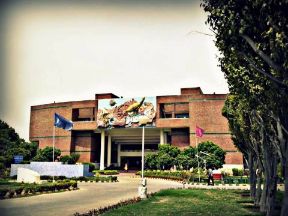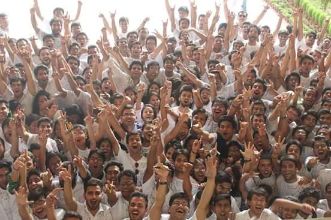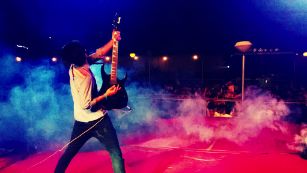|
Name of Lab
|
Description
|
|
Process Control Lab
|
Location: Room No. 010, Block VI
The Process Control Lab provides training to the students (B.E (Instrumentation & Control), M.Tech(Process Control), and PhD) in the field of Process Instrumentation, control and optimization. A number of PCs are interfaced with Hydraulic, Electro-pneumatic and Electro-Hydraulic systems which are available to demonstrate dynamic processes and to monitor process variables. New equipments like Inverted Pendulum, 3 degree of freedom helicopter have been incorporated in the lab to enable students and scholars to work in the field of nonlinear system environment. Inverted pendulum systems make good bench top demonstrations of automatic control techniques. They are nonlinear, unstable systems which showcase modern control methods and have the added bonus of being exciting to watch. This laboratory has an inverted pendulum rig provided by the Educational Control Products Company. It is not the conventional rod-on-cart inverted pendulum, but rather steers a horizontal rod in the presence of gravity to balance and control the vertical rod. The 3 DOF Helicopter system is a simplified helicopter model, ideally suited to introduce intermediate to advanced control concepts and theories relevant to real world applications of flight dynamics and control in tandem rotor helicopters, or any device with similar dynamics. Students learn to develop a state-space model of the system, design a state-feedback controller to regulate the elevation and travel angels of the 3 DOF Helicopter, simulate the closed-loop position controller and evaluate its performance using the linear model of the 3 DOF Helicopter, implement the designed controller on an actual system and evaluate its performance.


|
|
Robotics & AI Lab
|
Location: Room No. 012, Block VI
Robotics Lab is developed to educate UG and PG students to understand the fundamental of pick and place operations as well as the applications in industry. The Lab has 3-mitsubishi arms where students used to understand real time operation of manipulators. These manipulators are interfaced with MATLAB and other platforms.Formula all code ROBOT is available in the lab for performing navigation in a maze and other tasks. Inverted pendulum and omni bundle robot are also available for studying the behavior of robotic systems. Apart from this, simulation of robotic manipulators is also done to test their behavior under the influence of different inputs. The Research students are working on robotic manipulator as well as double inverted pendulum and designing various controllers to improve the efficiency of the robotic arm.


|
|
Control Engineering Lab
|
Location: Room No.-112, Block - VI
This Laboratory caters to the need of Post Graduate (Process Control), and Undergraduate students of all branches such as Electronics and Communication Engineering, Computer Engineering, Instrumentation and Control Engineering, and Manufacturing Processes & Automation Engineering. This laboratory helps the students in understanding various controllers by providing them practical knowledge.
In this laboratory practicals are performed on various kits like: Transducer Trainer Kit, Potentiometer Error Detector, Temperature Controller System, Synchro Transmitter Receiver, DC Motor and AC Servo Motor control. Experiments on DC motor(CA06) are also performed. There is a mentor graphics tool for simulation of analog and digital circuits in the lab. Digital Storage Oscilloscopes (DSO) and Function Generators are also available. All types of simulations in continuous and discrete domain can be performed using MATLAB on computers. Associated with this is the block diagram simulation software SIMULINK, which is also used.
Experiments have been designed to observe and validate the time response and frequency response of control systems, performance criteria for optimizing the transient response, and system parameter identification. Students simultaneously work out the solution on the PCs using MATLAB and see exactly how the theoretical and practical observation differ.


|
|
Simulation/Computer Lab
|
Location: Room No 120, Block-VI
The purpose of the simulation lab is to perform mathematical modelling and numerical simulations of the different physical systems. Students will learn how to model complex systems using mathematical modelling, debugging, testing and analysing the system responses under various operating parameters and control scenarios. This will help students to understand the basics concepts and verify the system performance by performing various simulations. It enables students/researchers to develop methodologies, design system architectures and improve the system's response based on the outcome of the numerical simulations. It facilitates students to design, analyse performances both at the system level as well as component levels. and Students can perform mathematical modelling and numerical simulation related to Power system, Control methods, Biomedical instrumentation, Power electronics, Artificial intelligence, Power system analysis in this laboratory. This laboratory is fully air conditioned and well equipped with computers facility, various types of required software are as following:
• MATLAB/SIMULINK
• LabVIEW
• PSS
• Python
• C++

|
|
Electrical Measurement/EEE Lab
|
Location: Room No 142 & 013, Block-VI
The PEE / ELECT. MEAS. Laboratory is located on the first floor of the ICE Division in Room No. 142 Block VI. In this laboratory, students of B. E. IInd Semester and IIIrd Semester of all the branches come to perform the basic experiments. The experiments have been designed so that the students learn the basics of engineering.
The experiments are divided into two types:
- Hardware based
- Software based
Hardware Based: Though the world is moving fast towards digitization, some basic hardware experiments have been set up based on the syllabus of the theory courses. The experiments include:
- Virtual Instrumentation kits for performing experiments on DC network theorems, series RC, RL, RLC circuits.
- Measurement of power and power factor of circuits using 3-ammeter and 3-voltmeter method.Measurement of power and power factor of circuits using 3-ammeter and 3-voltmeter method.
- Measurement of resistance of metals and non-metals and study the effect of temperature on resistance, measurement of power consumed by pure R, L and C elements.
Software Based: Pspice based experiments have been designed for circuit simulation.
For research purposes, the equipments existing in the lab are:
- Trainer kits of AVR, PIC and ARM microcontrollers.
 background-color:#ffffff background-color:#ffffff
|
|
Mechatronics Lab /Bio-Medical Instrumentation Lab
|
Location: Room No. 212, Block VI
Biomedical Instrumentation Lab is developed to educate our students to understand the fundamental understanding of human body functioning and biological signal monitoring and to use that Also, to provide a multidisciplinary research in Bio Medical Instrumentation to develop better medical diagnostic/ therapeutic strategies and medical devices. At present Facility of Biomedical Data acquisition is available using AD Instruments PL3516 Power Lab 16/35 data acquisition system. The AD Instruments system has 16 bit (313 microV resolution in the 610V range) resolution. The Lab has latest facility of NI Educational Laboratory Virtual Instrumentation Suite (NI ELVIS) II which is a modular engineering educational laboratory platform. Design and prototyping platform for measurement and instrumentation, circuits, controls, telecommunications and embedded/MCU experiments.
 
|
|
Industrial Electronics Lab
|
Location: Room No 213, Block VI
Industrial Electronics Lab focuses on Power Electronics, Renewable Energy and Electrical Drives engineering. The Practicals designed in Lab are Renewable Energy Sources based using Custom Power Devises, DSP EVM boards, kits and d-Space based drive systems. IE Lab also provides resources for creating Electrical drives, Power Electronics based systems, emphasizing renewable Energy systems, emergency and backup Electric power sources and power quality systems. IED Lab is also advancing the matrix converters concept to a wide variety of next generation, energy efficient and environment friendly applications.
Facilities available
- Softwares: PSPICE, Multisim, MATLAB
- Hardware: dSPACE-1104, DC- DRIVES, AC- DRIVES, POWER ELECTRONICS TRAINER KITS, Power Supplies, Function Generators, CRO, 3- Phase Power Analyzer, 1-phase Power Analyzer, Digital Multimeters, DSP (TI-320-2822, 2407), Projectors, fast speed Internet connection and latest configuration of PCs.


|
|
Instrumentation Lab
|
Location: Room No. 214, Block VI
The lab aims as an experimental teaching aid to the students of Instrumentation and Control Engineering at UG and PG levels in addition to students from Manufacturing and Process Automation Engineering and Mechanical Engineering. The laboratory is equipped with tools for teaching the fundamentals of transducers based instrumentation systems including both the classical trainer based desktop kits and also the latest state of the art computer based systems on virtual instrumentation. Various types of transducers, data acquisition systems and Virtual Instrumentation using Lab-VIEW are the main components in the laboratory in addition to the computing facility. Recently, several electronics instrumentation experiments supported by Multisim and TI-ASLK have been added. This lab is able to attract several UG and PG students for their final year’s thesis wherein these students are able to publish their works in reputed international journals. Therefore, many top ranking students dream to work and get associated with this laboratory. Industrial consultancies are the next components being planned to be introduced in the lab.
|
|
Electric Drives Lab/Machine Lab
|
Location : Room No. 008, Block -VI
This lab provides practical understanding and demonstration to the undergraduate and postgraduate students about the various components of electrical drives. This lab demonstrates the coordinated working and control of various components of electrical drives. The experimentation comprises the various setups for the control of ac motor drives including induction motors and synchronous motors fed through inverter/cyclo-converter/ac voltage regulator. It also has a setup to demonstrate control of dc motors (separately excited and self excited) fed through a chopper or rectifier. The lab also provides a learning environment to understand the challenges in data acquisition and controller design for electrical drives.

|
|



